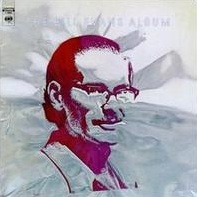| The Bill Evans Album | ||||
|---|---|---|---|---|
 | ||||
| Studio album by | ||||
| Released | End of August/early September 1971[1] | |||
| Recorded | May 11–12, 17, 19–20 and June 9, 1971[2] | |||
| Studio | CBS 30th Street Studio, New York City | |||
| Genre | Jazz | |||
| Length | 70:27 | |||
| Label | Columbia C 30855 | |||
| Producer | Helen Keane | |||
| Bill Evans chronology | ||||
| ||||
| Review scores | |
|---|---|
| Source | Rating |
| AllMusic | |
| The Rolling Stone Jazz Record Guide | |
| The Penguin Guide to Jazz Recordings | |
The Bill Evans Album is a recording by the jazz pianist Bill Evans, released in 1971 on the Columbia label. It was his first album to feature all compositions written (or co-written), arranged, and performed by him. On the record, Evans plays both an acoustic and a Fender Rhodes electric piano.
Of the album's seven compositions, four were new for this project: "The Two Lonely People," "Sugar Plum," "T.T.T. (Twelve Tone Tune)," and "Comrade Conrad."[5] Of these, "The Two Lonely People" would become a regular part of the pianist's performing repertoire and was recorded many times.[6] "T.T.T." is a tone row composition, employing the serial technique of composer Arnold Schoenberg; however, Evans "clothe[d] the line with diatonic harmony" and believed that twelve-tone music "was incompatible with the art of improvising."[7]
The title of the song "Re: Person I Knew" (recorded first on his 1962 Moon Beams album) is an anagram of the name of Evans's longtime producer, Orrin Keepnews.[8] The lineup of Evans originals is rounded out by two of his best-known compositions, "Funkallero," which although previously recorded by the pianist on several occasions was first released here,[9] and "Waltz for Debby."
A recording of Evans's composition "Fun Ride" was also made during these sessions and later collected on the compilation Piano Player (1998).[10]
The Bill Evans Album was reissued, with three bonus alternative tracks, by Sony in 2005.
The cover image is based on a photograph taken by music photographer Don Hunstein.
- ^ Billboard Aug 21, 1971
- ^ https://www.jazzdisco.org/bill-evans/catalog/ [bare URL]
- ^ Swenson, J., ed. (1985). The Rolling Stone Jazz Record Guide. USA: Random House/Rolling Stone. p. 73. ISBN 0-394-72643-X.
- ^ Cook, Richard; Morton, Brian (2008). The Penguin Guide to Jazz Recordings (9th ed.). Penguin. p. 457. ISBN 978-0-141-03401-0.
- ^ Pettinger, Peter, Bill Evans: How My Heart Sings, Yale University Press (1998), pp. 204-5.
- ^ "Bill Evans Discography," https://www.jazzdisco.org/bill-evans/discography/, JAZZDISCO.org, Accessed 7 June 2024.
- ^ Pettinger, p. 205.
- ^ Original issue liner notes by Fred Binkley, 1971.
- ^ "Bill Evans Discography."
- ^ Keepnews, Orrin, liner notes, Piano Player, Columbia/Legacy CK 65361 (1998), p. 10.